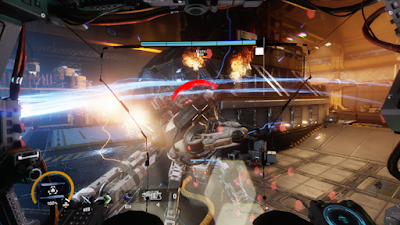--Jack Cooper, Titanfall 2
While the first Titanfall delivered an excellent multiplayer experience, the absence of any significant single player functions dramatically limited the scope of the game. Titanfall 2 improves the multiplayer, but it also features a campaign that expounds upon the franchise lore that was not thoroughly explored in its predecessor. The campaign follows a protagonist named Jack Cooper as he aids the Frontier Militia with the assistance of a Titan ally, providing a supplement to the frenetic action of the multiplayer modes. It also explores a particular ramification of AI technology that is only becoming more relevant to modern society.
Production Values
Despite the large scale of some of the in-game events, the frame rate and visuals work together well throughout both single player and multiplayer. As one might expect, the Titans themselves are among the most detailed objects in the game, and the accompanying audio allows for a fairly deep exploration of the individuality of a particular Titan called BT-7274. Voice acting is thus a much more central feature this time around, and it effectively develops the relationship between Cooper and BT-7274 throughout the campaign. These two primary characters carry the story, which would be somewhat generic without their presence and without the execution of certain set pieces--not that the story is bad, but it is not particularly noteworthy when held up against that of other shooters.
Gameplay
The traditional Titanfall gunplay (yes, the smart pistol does return!) is just as good as it was before, but the addition of a story mode brings new elements to the game. More specifically, the protagonist and his Titan often speak to each other. The introduction of time-sensitive dialogue options provides players with some measure of control over certain conversations with BT-7274. However, these choices do not impact the trajectory of the story or the ultimate development of the relationship between Cooper and his Titan. Regardless of dialogue decisions, you get to obliterate enemy Titans during a search for a weapon of mass destruction powered by an energy source called the Ark. As you start, your weapons are limited, but you naturally locate new Titan loudouts.
Collected at specific point in the relatively brief campaign, these various Titan loudouts allow access to diverse kinds of weaponry and abilities that can be swapped at any time during combat or between firefights. There are other collectibles in the form of pilot helmets scattered throughout the environment, but these are accessed on foot and often require strategic acrobatics (the ability to run on walls in particular) to reach them. The acrobatics are not just helpful in single player, though; they can be very useful in multiplayer as well. Of course, multiplayer is the most popular aspect of the Titanfall franchise, and it makes a strong comeback in the sequel.
Multiplayer has been expanded so that even Titans themselves can be leveled up, in addition to the human pilots and the firearms they use. One can also prestige one's XP status once the top level is reached for a pilot, Titan, or weapon respectively (similar to the prestige function in Call of Duty). Many of the same game modes from the first Titanfall's multiplayer return, including Frontier Defense, a cooperative mode where four players defend a Harvester from five waves of increasingly powerful enemies. The rewards system and distinct modes are deep enough to deserve dozens of hours from completionists.
Story
Minor spoilers below!
As an interplanetary corporation called the IMC plunders resources from multiple worlds, a rebel soldier named Jack Cooper trains to become a Titan pilot under an experienced veteran. However, his mentor suffers a fatal wound, though he is able to authorize his Titan to work with Cooper shortly before his death. Cooper subsequently develops a unique bond with the machine as the two aid the resistance in its efforts against the IMC.
Intellectual Content
Titanfall 2 is one of the only games that comes to mind where the thematic content of the story is actually executed better than the general narrative itself. At the core of the campaign's storytelling and mechanics is the friendship between Cooper and his mentor's Titan, BT-7274. The concept of AI companions is often associated largely with servile robots that perform utilitarian functions on behalf of humans or with sex robots, but AI has the potential to interact with humans in a much more broad manner. Genuine human-AI friendship is far from impossible. Moreover, this kind of friendship might be quite common in the near future, whether the robots in question are outwardly indistinguishable from humans or are massive exoskeletons with seeming or actual consciousness.
Conclusion
Titanfall 2 is a definite improvement over its predecessor, as the mere inclusion of a campaign gives it a scope that the first game clearly lacked. To be sure, the campaign is not incredibly unique apart from the centrality of the connection between Cooper and BT-7274 and several miscellaneous, temporary gameplay mechanics, but its core theme of human-machine relationships is handled quite well. It is the multiplayer, unsurprisingly, that carries the bulk of the Titanfall name in this sequel. The depth of the multiplayer is what will likely draw in many players. If you want a game comparable to Call of Duty but with some unconventional features, Titanfall 2 is a great option.
Content:
1. Violence: Shooting at biological enemies and smashing them with a Titan are bloody affairs.
2. Profanity: "Son of a bitch" is uttered in the campaign.




















No comments:
Post a Comment